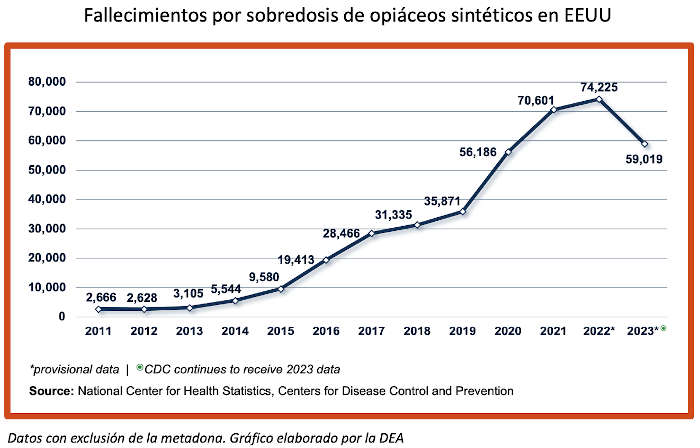In recent years, more than 100,000 people have died in the United States from drug overdoses. The boom in the consumption of synthetic opiates, especially fentanyl, manager of more than 70,000 deaths in the country in 2021 and in 2022, has concentrated all the alarms. Much of this drug comes from Mexico, but precursors and other elements from China are used in its manufacture. Is Beijing using the fentanyl epidemic as a weapon against the United States? Its involvement in the trade has been evident, although purpose may be debatable.
The United States is facing the most lethal drug epidemic in its history, with more than 100,000 overdose deaths annually, mostly caused by fentanyl consumption. Fentanyl, a synthetic opioid 50 to 100 times more potent than morphine, is produced in laboratories. It has become the leading cause of death among Americans aged 18 to 45 and is a major factor in the nation's historic decline in life expectancy. While the human impact is the priority, in a crisis of this magnitude the economic repercussions must also be considered. In 2020, the total cost of this epidemic was estimated to reach nearly $1.5 billion.
Given that all of the fentanyl consumed in the United States is not produced domestically, but is manufactured abroad, a question arises core topic: where does the fentanyl come from and how does it get to the United States? In the midst of this serious status, one main manager: China. According to the Drug Enforcement Administration (DEA), China plays a significant role in this crisis, being the main provider of illegal fentanyl and other derivative compounds into the United States.
Until 2019, China was the leading source of finished fentanyl for the U.S. illicit market. However, that same year, the Chinese government included all fentanyl derivatives on its list of banned narcotics. This move did not stop the arrival of fentanyl, however, as the ban was limited to the production of its final version, which opened up a new avenue: the manufacture of the precursor chemicals needed to create it, as determined by a research carried out in the House of Representatives by the committee on the skill Strategic between the United States and the Chinese Communist Party (CCP).
That research was intended to better understand China's role in this crisis. It has established that companies in China produce virtually all of the illicit fentanyl precursors and that the smuggling is done through Mexico. Mexican criminal groups acquire fentanyl precursors in China and then traffic the finished fentanyl from Mexico to the United States, in operations that have been reported from various sources.


